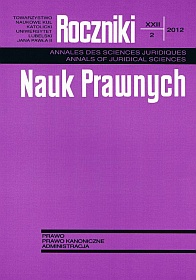Unification of the Local Government System in the Second Republic of Poland
Abstract
The Author analyses the complicated legislation of self-government of the Second Republic of Poland to show that the unification of the system at that time must have run into numerous problems. It was important to adjust the inherited structure of the enslaved state to fit the needs of a modern state.
Initially, in the area of the former Russian partition, collective communes existed, divided into gromadas, while the lands of former Austro-Hungarian and Prussian partitions featured individual communes. Attempts that were undertaken in the 1930s to unify the basic administrative division of the State were not finalized due to the outbreak of World War II. The aim of the presented study was to demonstrate the complexity of the territorial structure of the Polish State in the years 1918-1939. The complexity of domestic issues (separatist movements in the east and the international relations of the 1930s) prevented a full unification. It must be noted, though, that local government worked quite well at the time.
Copyright (c) 2012 Roczniki Nauk Prawnych

This work is licensed under a Creative Commons Attribution-NonCommercial-NoDerivatives 4.0 International License.


